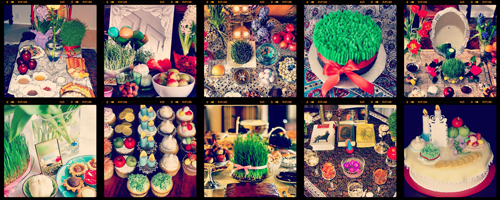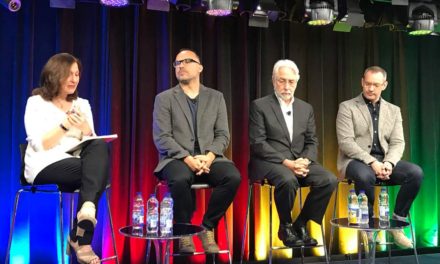Sima Sahar Zerehi – It started on Monday with a call from a photographer friend of mine who has recently moved to Canada from Iran. He was interested in capturing images of Nowruz festivities in Toronto and was asking about events and celebrations to cover.
Then it was an email on Tuesday morning from a colleague who works for a mainstream radio show scouting for a story on Chaharshanbe Suri (the Iranian festival of fire held on the night before the last Wednesday of the year). A few minutes later it was a message from another friend who works with a television station looking for a place to capture images of people jumping over bonfires. Finally, it was a text message from an Iranian-Canadian buddy: “you doing anything for Chaharshanbe Suri?” I apologetically said no and she replied “me neither, #PersianFail.”
That got me thinking, when had I dropped the ball on properly celebrating Nowruz; from spring cleaning, buying new clothes for the holidays, Chaharshanbe Suri and Haft-sin (the traditional Nowruz spread) to the end of the holidays marked by the Sizdah Bedar picnic.
I’m not sure when it happened. It was probably sometime after high school.
Once we stopped having March Break we also stopped celebrating Nowruz. Reading week in university never fell in sync with the spring equinox and it became too hard to get together as a family, especially because my sister and I were going to school in Vancouver and my parents lived in Toronto.
At first I tried to hold on to the tradition, the first day of spring couldn’t be left unmarked. I decided to organize a Haft-sin in my university dorm room with the help of my non-Iranian friends.
Sensing my homesickness they willingly trekked to the Iranian enclave in North Vancouver in search of the essentials for my Nowruz spread. I had prepared a list of must-haves following a quick internet search and mandatory call to my mom.
List in hand, we started scouring the almost empty shelves of the shops for sabzeh (sprouts grown to symbolize rebirth), Sonbol (Hyacinth plant), somaqh (sumac berries), samanu (a sweet pudding made from wheat germ), and golab (rose water) as well as Iranian sweets, nuts, bread and cheese.
This was no easy task, with Nowruz only a few days away most of the shops had sold out their holiday supplies. But with perseverance and by begging a few storeowners to sell us items from their own holiday displays we were able to accomplish our goal.
The other elements; garlic, apples, eggs, coins, a mirror and candles were easy enough to cobble together. Being in our vegetarian hippy phases we decided to forego the goldfish and opted instead for an orange floating in a bowl of water.
My family’s Haft-sin usually included a traditional book of poetry such as the Shahnameh or the Divan of Hafez, but being short of Iranian reading material in my dormitory, I opted for a copy of my dad’s poetry book, which I always carry with me.
I remember sitting in my dorm room that Nowruz, munching on Iranian sweets, while decorating hard-boiled eggs with my floor mates. It seemed like everyone in my residence was dropping by my room to nibble on Iranian flavoured sweets and listen to me recount stories about Iranian New Year traditions such as Chaharshanbe Suri; and Sizdah Bedar (the thirteenth day of the new year festival celebrated by family picnics).
For a few years I kept that Nowruz tradition alive, I even dubbed it Nowruz at Nootka (the name of my dormitory), but when I moved out of student housing, the tradition receded. Without the support of the community of friends and housemates it seemed too hard to celebrate Nowruz.
When my sister and I both moved back to Toronto, we tried to rescue our Nowruz tradition as a family, but it’s hard to find the time to celebrate when your family business is an Iranian newspaper with a special holiday edition and a huge Nowruz Gala.
Either way it never felt like spring in March in Toronto. With snow still on the ground and below zero temperatures it was hard to muster the spirit of rebirth and rejuvenation.
But this year spring has come early, true, it’s probably due to climate change, but the sunshine sure feels good.
With spring literally in the air, I felt like I had no excuse but to give in to Nowruz. So far, I’ve missed Chaharshanbe Suri but as Hāji Firuz (our version of Santa Clause) is my witness I will not forego the Haft-sin.
How are you celebrating Nowruz?
With Nowruz on my mind I decided to ask some young Iranian-Canadian friends about their Iranian New Year traditions and how they’re planning on celebrating the holiday this year.
“I always do something for Nowruz,” states Tara who has been in Canada for 18 years. “When my mom is here we go full out, but when I’m on my own I always make sure I at least have a new dress and flowers in the house, and I call each and every one of my family members all over the world, every year.”
She adds, “Celebrating Nowruz is my way of reconnecting with who I am through the traditions of my childhood, and also with who I am as an Iranian outside of Iran.”
Tara thinks that those of us outside Iran take more pleasure in the holiday than our family and friends in Iran. She states, “I feel more joy about Nowruz than most of my family in Iran because it’s all around them. I have to make a conscious effort to surround myself with spring and renewal and tradition, so it’s important to me.”
Tara has yet to finalize her plans for Nowruz but she has already taken some steps towards celebrating the holiday. “I’m not sure what my plans are, they are up in the air, but I have my new dress and plans to fill my house with flowers. I love how symbolic the Haft-sin is, so if I can make it uptown I’ll try to have one this year.”
Like Tara, Ronak who was born in Canada, sees Nowruz as an opportunity to reconnect with her roots. She explains, “Nowruz holds a special place in my life. As a diasporic Iranian-Canadian, it’s the one time of the year I feel fully Iranian.”
She adds “I remember as a kid, I’d try my best to stay up late for the countdown as it was broadcast on satellite TV. I’d always look forward to ‘aidee’ (my New Year’s gift) and would make a budget to buy CDs with the money I got.”
“Now as an adult, I look to Nowruz as a chance to learn more about myself, my family’s history, and my relationship to what it means to be Iranian,” notes Ronak.
“Last year my mom printed me an article on what the Haft-sin represents. When I read the article, I understood that there’s so much about Iranian culture I don’t understand but it compelled me to learn more.”
“This Nowruz I’m going to read some English translations of Forough Farrokhzad’s. poetry I can’t read or write Farsi so when I found a collection of English translations of Forough’s poems, I was very excited because she is my mom’s favourite poet.”
Ronak is also planning on incorporating new elements from contemporary Iranian culture into her Nowruz tradition, “I will also be listening to some diasporic Iranian music (such as LA-based rapper A$A Soltan), and go to a dance party with my parents.”
But like many others for Ronak reconnecting with family is a big part of Nowruz. She admits, “The one thing I’m looking most forward to is talking to my younger cousins in Iran, to get the scoop on their school-holiday gossip, hear about how much ‘aidee’ they got and to hear their excited voices over the phone. I have only ever met my grandmother and one uncle, so Nowruz is always the time I get to talk to all of my extended family on the phone, I love it.”
Like Tara and Ronak, Nahayat, who was born and raised in Germany and has been living in Canada for 11 years, sees Nowruz as a way to reconnect with her community. She states, “As cliché as it sounds, it’s always important to remember your roots and where you came from. And, really, what’s more Persian than the celebration of Nowruz?”
For Nahayat the important element in Nowruz is spending time with loved ones. She states, “I think with any holiday, whether Persian or not, it’s important to spend it with those closest to you. In my case, that’s with my family. I will probably just get together with the family, my cousins, aunts and uncles. It’s all about good food and good company.”
Ghazal who’s been in Canada for three years sees Nowruz as an opportunity to keep her culture alive. She notes, “I celebrate Nowruz each year because I care about my culture and traditional events and it is our responsibility to keep them alive.”
For Gahazal, Nowruz comes with a few rituals, “I always grow my own ‘sabzeh’ instead of buying it from a store. I also make cookies (shirini-e-eid) a few days before the first day of spring as well as rice and fish on New Years Eve.”
Celebrating Nowruz in Canada has been different than celebrating in Iran for Ghazal. She recounts, “I was always grounded on Chaharshanbe Suri when I was in Iran because my parents were extremely worried about the response of government officials who tried to shut down the festivities.”
She adds, “In Canada, it’s much better, since you can have a peaceful Chaharshanbe Suri by getting a permit and celebrating it in a park.”
This year Ghazal celebrated Chaharshanbe Suri with a group of Iranian-Canadians by gathering around a bonfire at a local Toronto park and posting photos on social networking sites such as Facebook and Instagram.
Farzad admits that for his family the Nowruz tradition has eroded over the years.
“Ever since our family came to Canada over 25 years ago, we slowly stopped celebrating. Slowly over the years it went to smaller and smaller celebrations until now, when it’s almost non-existent.”
Farzad explains, “We all got wrapped up in our daily Canadian life, busy with work and everything. Sometimes we even forget about Nowruz to be honest. That really sucks because we also don’t really celebrate Christmas so there really isn’t an occasion for a celebration in my family these days.”
While Farzad and his family have stopped celebrating Nowruz together, he is still planning on marking the holidays by taking Iranian pastries to work to share with his colleagues and by getting together with friends at Banu, an Iranian vodka and Kabob bar on Queen Street West.
Sina who’s been in Canada for 15 years states, “I’m planning on celebrating Nowruz this year, because I love to partake in any holiday that celebrates the good things in life and Nowruz is the grand daddy of them all!”
To celebrate the holiday Sina is foregoing the big Nowruz events for a quiet evening with family and friends.
______________________________________________________________________
Help us learn more about how Tehranto celebrates Nowruz by sharing your holiday traditions. You can tell us about your Nowruz celebrations by sending us a note, a picture or a video clip. Send all submissions to sima@shahrvand.com or news@shahrvand.com or simply post your comments here . . .






